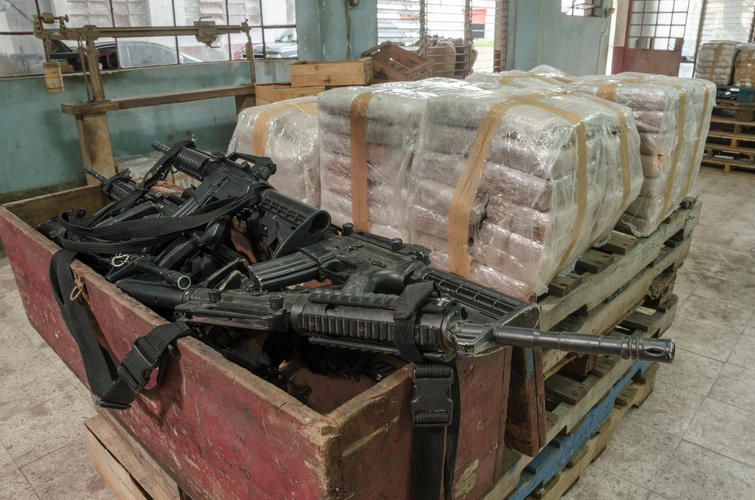In one of his first acts after reclaiming the White House, President Donald Trump signed an executive order designating drug cartels as “foreign terrorist organizations and specially designated global terrorists.”
The decision could redefine strategies for combating international organized crime by expanding America’s arsenal of tools while igniting debates over sovereignty, law enforcement tactics, and the potential for unintended consequences.
By labeling drug cartels as terrorist organizations, the U.S. government gains access to a suite of enhanced legal and military powers to target these groups. From freezing assets to authorizing military strikes, the designation mirrors America’s approach to combatting global terror networks like al-Qaeda and ISIS.
While the move signals a bold commitment to combating the cartels’ influence, it also raises critical questions: Why wasn’t this designation made earlier, and how might this policy shift alter the fragile dynamics between the U.S. and its southern neighbors?
“The Cartels’ activities threaten the safety of the American people, the security of the United States, and the stability of the international order in the Western Hemisphere,” Trump’s Executive Order reads. “It is the policy of the United States to ensure the total elimination of these organizations’ presence in the United States and their ability to threaten the territory, safety, and security of the United States through their extraterritorial command-and-control structures, thereby protecting the American people and the territorial integrity of the United States.“
The declaration of drug cartels as terrorist organizations fundamentally changes the rules of engagement. Previously treated as criminal enterprises, cartels like Mexico’s Sinaloa and Jalisco New Generation have amassed such power that they now rival the capabilities of small nations, employing military-grade weapons, private armies, and advanced financial networks. Their influence extends well beyond drug trafficking, touching human trafficking, arms smuggling, and political corruption.
The President’s Executive Order also explicitly mentions Tren de Aragua (TdA), a Venezuelan criminal enterprise, and Mara Salvatrucha, commonly known as MS-13, as transnational criminal organizations now designated as terrorists.
Under Trump’s directive, the Attorney General, the Secretary of Homeland Security, and the Secretary of State have been given 14 days to “make operational preparations“ for implementing the administration’s new policy to combat drug cartels.
By elevating these groups to the status of terrorist organizations, the U.S. can now leverage anti-terrorism laws to dismantle their operations more aggressively.
For instance, individuals who provide material support to these cartels can face harsher penalties, akin to aiding a foreign terrorist group. Additionally, intelligence agencies such as the CIA and NSA may take a more direct role in surveilling cartel operations, a task traditionally managed by the DEA and FBI.
The timing of Trump’s declaration reflects the escalating threat posed by cartels. According to U.S. government reports, overdose deaths linked to synthetic opioids like fentanyl have reached record levels, with the majority of these drugs smuggled across the U.S.-Mexico border by cartel networks.
Additionally, high-profile incidents like the kidnapping and murder of four Americans by members of the Gulf Cartel in the Mexican border town of Matamoros in 2023 highlight the cartels’ brazen violence and have prompted widespread outrage in the U.S.
Reports also indicate that the surge in cartel violence in recent years has significantly contributed to an increase in migration to the U.S., with many crossing the border illegally in search of safety.
Yet, the decision to label cartels as terrorist organizations is not without controversy. Historically, previous administrations refrained from taking this step due to concerns over diplomatic fallout.
Mexico, America’s key partner in addressing cross-border crime, has repeatedly opposed the terrorist label, fearing it could lead to unilateral U.S. military action on Mexican soil, a violation of sovereignty that could strain bilateral relations.
The reluctance to designate cartels as terrorist organizations has historically stemmed from legal, diplomatic, and practical considerations. While the cartels’ brutal tactics—beheadings, bombings, and mass killings—mirror those of terror groups, their primary motivation is profit rather than ideological warfare. This distinction has led past administrations to treat cartels as criminal syndicates rather than national security threats.
Traditionally, the U.S. has relied on a combination of police work, economic sanctions, and intelligence-sharing to combat cartels.
However, the President’s designation of cartels as terrorist organizations brings a powerful arsenal of tools to the table. The U.S. Treasury can freeze assets linked to cartels more swiftly, while law enforcement agencies can charge accomplices under harsher statutes.
In response to the recent designation, the Washington, D.C.-based consultancy firm FTI Consulting urged businesses operating in Mexico to reassess their risk management strategies and enhance due diligence when working with third parties.
“The bottom line is that companies must assume that their operations in Mexico could be much more heavily scrutinized by U.S. law enforcement agencies at any point in time,“ FTI writes. “In this context, ensuring that they are equipped to prove with appropriate technical detail and nuance that they have been diligent with their legal obligations can mean the difference between being able to swiftly address an issue or seeing it become a public international scandal.”
Most significantly, the Pentagon can now justify direct involvement in cartel-related operations, the same way the U.S. military has combated Jihadist terror groups like ISIS, Al Qaeda, or Boko Haram. This could include targeted drone strikes or special operations missions.
When questioned by reporters on Monday night, President Trump did not dismiss the possibility of deploying U.S. special forces into Mexico to target cartel operations. It could happen,“ Trump remarked, adding, “Stranger things have happened.”
Experts caution that this aggressive approach could have serious unintended consequences. In a 2023 paper, Brian Jenkins, a senior advisor at Rand, warned that employing military tactics similar to those used in the Middle East during the war on terror might provoke cartels to escalate their methods, potentially retaliating with attacks on American citizens or interests.
“U.S. missile strikes could easily escalate into a broader conflict, making a terrible situation even worse,“ Jenkins wrote. “In response to attacks on their leadership and threats to their livelihood, any self-imposed constraints on attacking Americans will erode. Drug cartels could easily turn into real terrorist organizations.“
“Over 1 million U.S. ex-pats live or work in Mexico. They and their firms could become targets for reprisals. With connections to gangs in the United States, terrorist attacks could occur here as well, provoking further American responses.“
For Mexico, the designation threatens to strain an already delicate relationship. While the country has cooperated with the U.S. on various anti-narcotics efforts, the U.S.’s expanded ability to target cartels under counterterrorism protocols could escalate tensions—particularly if American forces were to carry out cross-border operations without prior approval. Such actions would infringe on Mexico’s sovereignty and could also be interpreted as an act of war.
Implementing this new policy will depend on whether the U.S. can strike a balance between aggression and diplomacy and address the root causes of the cartel problem without resorting to measures that cause more harm than good.
Ultimately, experts contend that without tackling the root cause of domestic drug demand in the United States, attempts to dismantle cartels will remain ineffective, perpetuating a cycle of violence and blame between the two nations.
This stark reality highlights the need for a comprehensive approach beyond enforcement. A successful strategy must include prevention and rehabilitation initiatives on both sides of the border, addressing the social and economic factors fueling drug consumption and cartel influence.
Dr. Carlos Pérez-Ricart, an author and assistant professor of international relations at the Center for Research and Teaching in Economics (CIDE) in Mexico City, underscores the futility of treating cartels like terrorist groups such as ISIS or Al Qaeda.
“The drug phenomenon is based on demand in the United States, not on supply,“ Dr. Perez-Ricart told the Spanish news outlet El Pais.
“As long as the demand for drugs persists, it is impossible to think that the problem can be attacked at the source: Mexico.”
Tim McMillan is a retired law enforcement executive, investigative reporter and co-founder of The Debrief. His writing typically focuses on defense, national security, the Intelligence Community and topics related to psychology. You can follow Tim on Twitter: @LtTimMcMillan. Tim can be reached by email: tim@thedebrief.org or through encrypted email: LtTimMcMillan@protonmail.com

